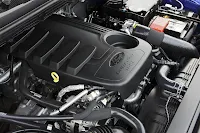 |
| Photos courtesy of Ford Press |
Pick-up trucks, by nature, serve a single purpose: they’re a workhorse. They are the modern ‘beast of burden’—rarely beautiful, but highly prized for their durability and dependability. However, as consumers are introduced to much more sophisticated fare, how can this lowly beast remain true to its humble origin, and yet, serve its new generation of masters?
For Ford and its all-new Ranger, the answer is quite simple: remain true to your brand DNA. Though this may sound so simple, in reality, the Ranger’s design and development proved quite challenging; after all, how would you blend its 20-year history with a clean-slate design? The end result is this: unanimously, the most revolutionary pick-up ever.
From the ground up, the 2012 Ford Ranger is all-new. There are little carry-over parts, and those that are, easily fit inside your pocket. Yet, a single glance alone is enough to convey a power reminder that this is a Ford; that this carries the Blue Oval’s rich and illustrious history while remaining truly modern and high-tech. The overall look is simple, straight-forward and brash. The front is dominated by Ford’s signature three-bar grille which is chromed in all but the range-topping Wildtrak model (it swaps the ‘bling’ for a sportier high-gloss black finish). Flanking the grille are large, squared-off headlamps with the power-domed clam-shell hood design serving as the final exclamation point.
Moving to the side, the Ranger manages to dismiss the slab-sided look all-too-common with pick-up trucks with something that looks as if it’s been shaped by the wind. Though limited by its natural silhouette, the Ranger manages a 0.39 co-efficient of drag, which makes it the most aerodynamic pick-up. It does this through lots of nifty design details. First, the windshield has been raked back which channels the wind across the pick-up bed (the most common source of aerodynamic drag), and on to a built-in rear spoiler on the tailgate. Second, the alloys, in whatever size (from 16-18 inches) are designed to remain flushed within the wheel well. Third, the wheel lips themselves are now made from a single, stamped piece of metal. Devoid of any plastic add-ons, it allows air to move freely. And lastly, the gaps between body panels have been significantly reduced.
As smart as the Ranger is on the outside, it’s absolutely genius inside. Having a tough wearing interior that will stand up to the demands of a workhorse is an absolute given, but the Ranger manages to cram all the features you’ve come to expect in a passenger car. For instance, there are more than 20 storage spaces in the cabin, including a cooled center console bin. In addition, the glove box is large enough to accommodate a 16-inch laptop while the door pockets can fit 1.5-liter bottles comfortably. There is even ample storage for mobile phones and other small items located around the console, all within easy reach of the driver. The rear bench seat can even be folded up, revealing two hidden storage bins for tools and other items.
While there’s a lot of space for your gadgets and drinks, there’s even more room for five full-grown adults inside. With its B-pillar moved forward, it delivers best-in-class rear leg room and knee clearance, allowing two six footers to comfortably sit behind one another.
In addition to class-leading space and storage, the Ranger also takes connectivity to a whole new level with an array of smart technologies that make driving easier and safer. On higher-end models, dual zone climate control and cruise control are available and on the Wildtrak model, there’s even voice command integration for its Bluetooth, USB and iPod.
Engineered as the next-generation pick-up truck, the Ranger’s entire drivetrain system has been made to give customers a combination of power, efficiency and durability. Leading the way is Ford’s new Duratorq 3.2-liter inline-5 engine with 200 horsepower and 470 Nm of torque. For those who prefer a smaller displacement, the Ranger also comes with a new Duratorq 2.2-liter capable of outputting 150 horsepower and 375 Nm of torque.
Channeling all this power onto the road is a choice between a six-speed manual or six-speed automatic transmission. But whatever you choose, they are designed to provide reduced engine revs and extend the Ranger’s driving range whether in city traffic or on long highway trips. Fitted with an 80-liter fuel tank, the Ranger has a potential range of more than 1,000 kilometers.
Aside from its world-beating engines, the Ranger has been designed and tested to stand up to the toughest challenges, be it carrying, fording or climbing. In fact, the Ranger’s water-wading capability is the best in its class—enabling both 4x4 and 4x2 models to wade through 800 millimeters of water even when fully laden. There’s impressive ground clearance of 237 millimeters as well as an outstanding payload capacity of more than 1,400 kilograms.
The all-new Ford Ranger is the immediate culmination of four years hard work by almost 500 engineers from around the world. But more than that, it’s the pinnacle of the Blue Oval’s more than 60 years of experience in the pick-up genre. Truly, the all-new Ford Ranger shows that it’s been designed, engineered and produced to lead—just like it always has.













i wanna know the actual city driving Fuel Consumption, since Ford has a reputation of Low FC (km/L)? I want to have an honest review..I really like to buy one but haven't seen any good review. Please help
ReplyDeleteCheck out this story:
Deletehttp://www.carguide.ph/2012/10/review-2012-ford-ranger-xlt-at.html
The actual city fuel consumption of the Ranger is in there.